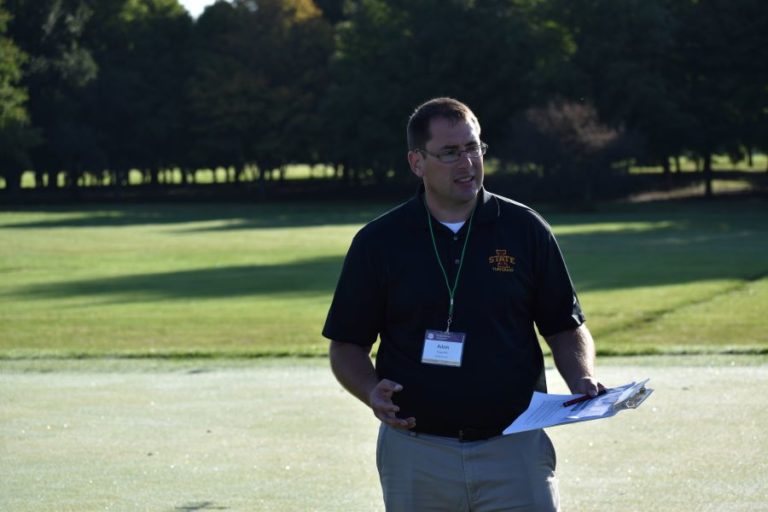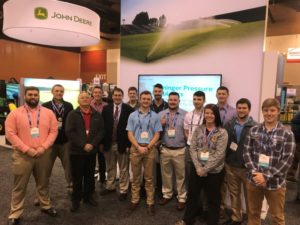In this edition of The SportsField Management Interview, we meet Adam Thoms, Ph.D., assistant professor of commercial turfgrass in the Department of Horticulture at Iowa State University. Thoms oversees sports turf research at Iowa State, and is the turfgrass extension specialist for Iowa. In addition to research and extension activities, Thoms teaches three classes and serves as an advisor to the Iowa State Turf Club. Thoms serves the SFMA (formerly STMA) Board as academic director, serves on the SFMA Editorial Committee, and is the technical editor for SportsField Management magazine.
SportsField Management (SFM): Please tell us about yourself, where you are from, and your background.
Thoms: I grew up in Waverly, Iowa, was active in 4-H and FFA growing up, and went to Iowa State University for undergraduate. In high school, we played a high school football playoff game in snow/slush conditions, and it was hard on our field. The next day I came to school and saw our field manager fixing the field and thought that was pretty interesting. From there I was off to find a school that would teach about turfgrass management (ISU was close for me). Graduate school was at University of Tennessee (M.S. and Ph.D.) with Dr. John Sorochan.
SFM: What attracted you to the academic side of the industry, and what has been your career path thus far?
Thoms: As an undergraduate, I was working for Mike Andresen on the Iowa State Athletics grounds crew, and he and Dr. Minner had pushed me to participate in the new Student Challenge. I knew during undergraduate schooling that I wanted to pursue a bit more education, because the research interested me. At the STMA Conference that year, Mike took me over to meet Bobby Campbell and John Sorochan. We visited about graduate school, and when we got back from the conference Mike called me into his office and said I needed to go to graduate school. I visited U.T. and liked John’s research vision and the close relationship I could have to learn how the UT fields were managed by working with Bobby and his crew as well.
While at UT, I had the opportunity to be the Research Leader for the UT Center for Athletic Field Safety. This opportunity helped me learn so much more about both natural and synthetic turfgrass. Then, in July of 2016 I got the chance to return to Iowa as an assistant professor of commercial turfgrass in the Department of Horticulture.
SFM: In your current role, how much is research, how much is teaching, and how much is extension work? And can you give us an overview or breakdown of your areas of research, your teaching duties, and what is involved on the extension side of your role?
Thoms: Extension is 70 percent. I’m the state turfgrass extension specialist, so I cover the state helping plan field days and the Iowa Turf Conference, as well as conducting extension site visits. Those site visits are the favorite part of my job. Research is 20 percent. I have conducted several natural grass projects since coming to ISU, including learning more about how wetting agents can help with infield skin management, humic fertilizers, cultivation trials, and cultivar testing to name a few projects. In terms of teaching, I teach Hort 453 (Sports Turf Management) Hort 454 (Turfgrass Irrigation) and Hort 291A (Turfgrass Professional Development). I also advise 25 to 30 of our students, and I’m a co-advisor with Dr. Nick Christians of the ISU Turf Club.
SFM: What trends are you seeing with regard to today’s students, and what is the key to getting young people interested in the sports field management side of the turfgrass industry?
Thoms: I see more students who were in sports trying to stay near the game and wanting to manage athletic fields. We need to continue to promote it to anyone who is willing to listen. We have been lucky here in that in my time at ISU, both Tim Van Loo, CSFM, and Josh Tvrdik (ISU field managers) have been willing to help with tours of the ISU fields for anyone who is interested. So many people don’t know our industry even exists, so any promotion can help for sure.
SFM: Who were your mentors in the industry, or who has impacted your career the most?
Thoms: Mike Andresen, CSFM, gave me my first opportunity to work on a high-level athletic field. I tried to learn as much as I could from him. He was also very patient with me as I learned, and, at times, made plenty of mistakes. John Gray, Mike’s assistant at the time, taught many personal life skills. Dr. Christians and Dr. Minner were both great for my undergraduate turfgrass education. Bobby Campbell taught me a ton about warm-season turfgrass management and attention to details. Dr. John Sorochan helped me learn how to conduct turfgrass research, and so much about being a professional. He also is always great for a joke. Dr. Jim Brosnan helped me with improving my academic writing, a major skill needed. Tim Van Loo, CSFM, was a great joy to work with since arriving at ISU. He showed me the importance in rolling with the punches and to have fun.
SFM: What would you say are the biggest accomplishments of your career and/or what are you most proud to have achieved?
Thoms: I’m most proud of my students. Each of them comes into ISU and gets to find their way. They grow so much in their here and it is fun to watch them head of into the industry.
SFM: What are the biggest challenges you face, and how do you approach those challenges?
Thoms: Recruitment. Trying to make sure people know about turfgrass management career, and that they can do it for a career. And making sure people know about what it takes to manage both natural and synthetic turfgrass. So many people think synthetic turf is maintenance free, and it isn’t. And people often don’t even know where to start to manage a natural grass field.
SFM: You have been active in SFMA for a long time; you have served on several committees; and you currently serve on the board of directors. How has your career benefitted from being involved with the association? And what is your advice to other sports field managers regarding the value of being involved and giving back to the industry though service?
Thoms: I’ve met so many great people through committees and board service. I have enjoyed getting to know them all, and I enjoy most hearing about their field management issues. I also appreciate them helping me out when I have a student who wants to go to a certain town or part of the U.S. for an internship.
SFM: How do you think the profession and industry will change in the next 10 years, and/or what would you most like to see in terms of industry advancement in the future?
Thoms: I would love to see the respect for the job continue to rise. I think many athletic field managers do a great job but don’t get enough credit. I also think we will need to solve the labor shortage over the next 10 years. I don’t know if that is through greater pay or more work-life balanced hours, but something will have to happen soon to draw more people to the industry.
SFM: Please tell us about yourself outside of work (family, hobbies, interests, etc.)?
Thoms: I enjoy spending time with my wife, Rachel, and children, George and Greta, and watching the kids grow up and learn new things. I enjoy cheering on the Kansas City Chiefs on Sundays.
SFM: Is there anything else we might not have touched on that you would like to add?
Thoms: This past year I’ve gotten to be a part of a fun project growing the new football game and practice fields for ISU. We sand-capped six acres of cornfields in April and then seeded them to Kentucky bluegrass. The sod will be ready to be moved in May. It has been a fun and challenging project growing high-quality sod on an old corn field, for sure. But one that has brought great exposure to our college and department. The students have enjoyed it too.



